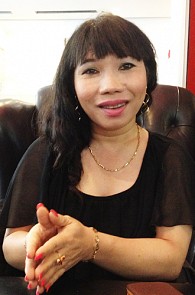Medical intervention can fulfill the emotional and physical needs of many trans-men and women, but how will these changes be embraced by our legal system? Have their wishes to lead a normal life been considered at all in Vietnam?
As an ID is required in almost any daily activity in our modern society, many transgender people in Vietnam still find it hard to do even the most basic tasks, from opening a bank account to traveling or obtaining a driver’s license. This is because the government has yet to legally allow sex reassignment surgery and have it recognized in official documentations. Successful cases, if any, are only exceptions in which there is considerable flexibility and circumvention from officials.
39-year-old Pham Le Quynh Tram is a school teacher who spent years struggling to obtain a new official identification. Before her sex reassignment surgery in Thailand, she was Pham Van Hiep from Chon Thanh, Binh Phuoc.
For over a year, she frequented the People’s Committee of Binh Phuoc Province to apply for a new ID and other relevant documents.
“I was rejected every single time I went there. But I was stubborn, and came so many times that they all knew me,” she said.
Her tireless efforts were fruitful after a year and a month later, when an official finally told her that the People’s Committee could handle the process at district level.
She then did as instructed. The papers required by the People’s Comittee of Chon Thanh District included medical proof to confirm her new sexuality and a verified translated certificate of the transsexual surgery provided by her hospital in Thailand. It may sound easy, but the process was time-consuming and at times confusing to her as there were no clear and coherent guidelines.
After all the obstacles, on the day she received her new official identification with a brand new female name, “I burst into tears,” she said, “Back when it didn’t show who I’d changed into, it was really difficult for me. Now I won’t have to explain and prove it to people everywhere I go.”
Not as fortunate as Tram, Jessica still has to bear the male name Nguyen Huu Toan on her new ID, although her gender is already changed to Female. The application process was not easy for her either, as she faced clear discrimination and lack of cooperation from government officers who handle this type of process and documentation.
“I hope one day the law will grant people like us an appropriate process of re-identification. I hope I can change my name one day, get married and live with the person I love,” Jessica said.
Make-up artist Le Duy, who has yet to obtain a new identification card, has to face the same tiresome identification issues every time she travels.
“I am held at security many times. No matter how I explain it, usually the officers can’t decide and have to ask for their bosses. Then comes the long process of showing them my old ID and my surgery certificate from the Thai hospital. Then they send me to a closed room for a full body search. I’m so tired of it,” she shared.
The same problems arised when she was pulled over by a police officer for a minor traffic violation. She was only allowed to go once she agreed to leave her motorbike with the police, and rushed home to grab her surgery certificate to prove what her ID could not.
“Ever since then, I do not go anywhere without that piece of paper. I have to have it with me!”
To avoid the great obstacles involved with these applications, many trans-men and women opt to pay money to have fake documents made, or bribe government workers to simplify the process or shorten the waiting period.
The lack of legislation on this particular issue not only causes great inconvenience, but clearly marginalizes many of the transgender community in our society, as their social and human rights are not recognized or protected. They lose out on many things, including stable job opportunities, medical care, and even the ability to vote.
To earn a living, many have to choose unprofessional or hazardous jobs that also give them little to no security and stability. Thus, instead of being encouraged to have a voice and more active role in our society, they are isolated and treated as outcasts.
Isn’t it time something is done about this?

























































